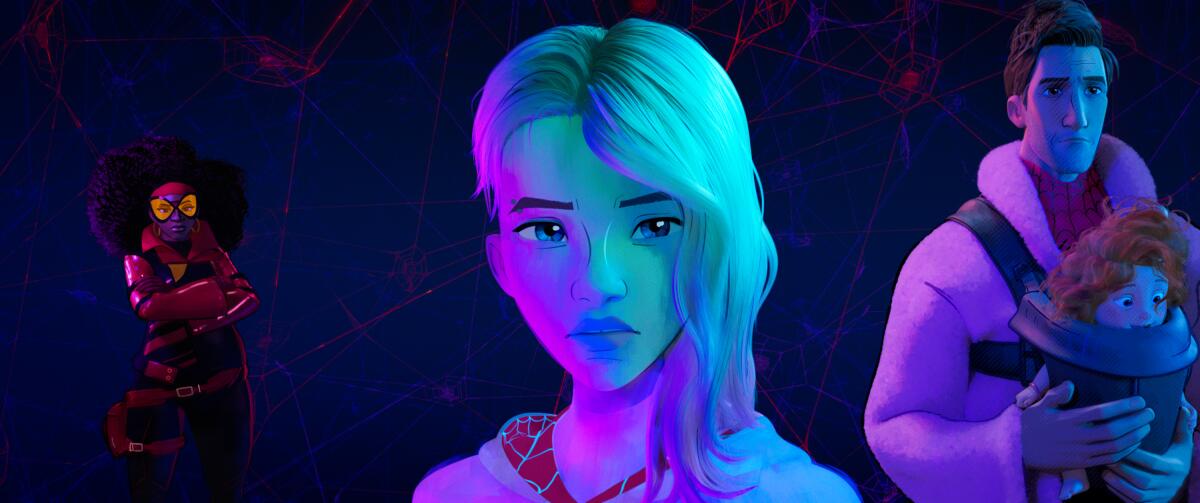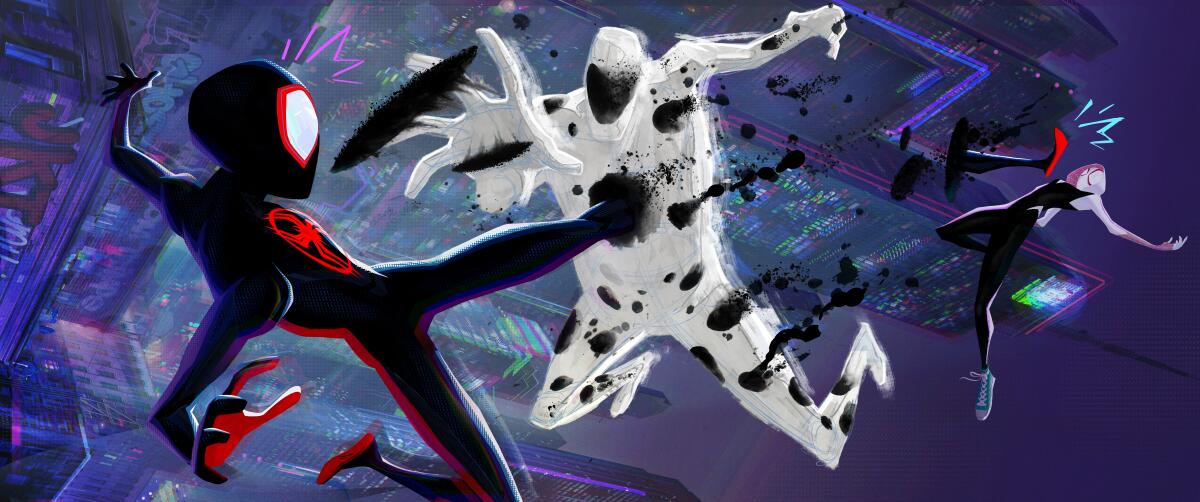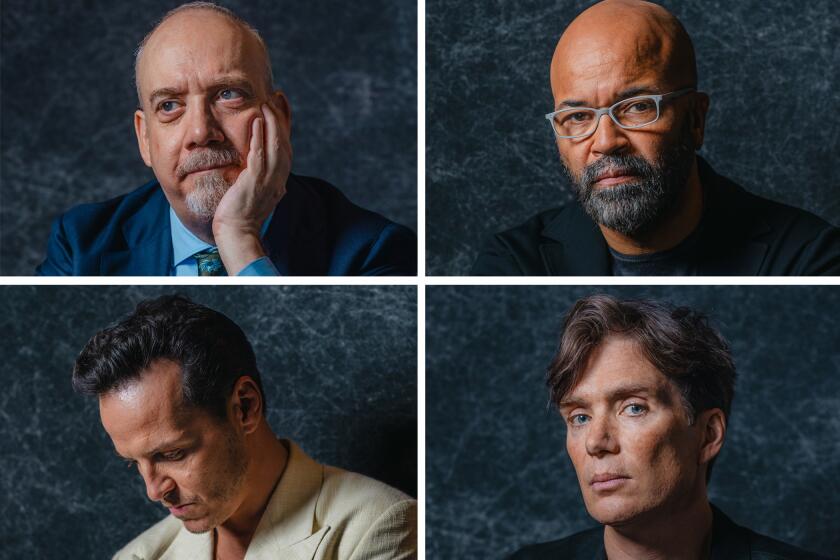The web in ‘Across the Spider-Verse’ connects what’s new with what’s essential

- Share via
“Spider-Man: Into the Spider-Verse” earned a 97% positive rating on Rotten Tomatoes, grossed more than four times its budget and won the Academy Award for animated feature. So, of course, when it came to making the sequel, “Spider-Man: Across the Spider-Verse” writers and producers Phil Lord and Chris Miller made their mantra what every studio simply loves to hear, expressed by the film’s first line: “Let’s do things differently this time.”
Miller says, “The first movie was appreciated for its innovations — among other things — how it was something you’d never seen before; a story told in a way that you had never seen before. So we felt if we’re going to do a sequel, if we just do more of the same, it’s going to be disappointing.”
But how to accomplish that, while keeping hold of the essential thread that runs through the best Spider-adventures?
Co-director Kemp Powers says, “When Phil and Chris first pitched me the story, it didn’t feel like they were pitching me a sequel. It felt completely original, starring some characters that I was familiar with. The arc of the characters, where they were going; it was a new thing, from my perspective.”

It’s not just the story that’s different (more on that later), but the environments and visual approach were new — itself a risk, considering how groundbreaking and widely praised the original’s look was. “Into” was set mostly in Brooklyn, the stamping grounds of Black Latino Miles Morales (his universe’s Spider-Man). “Across” takes viewers to other universes and other friendly neighborhood Spider-People. The filmmakers employed some of their favorite comic artists to help design the new worlds and characters.
But making “Across” different wasn’t enough. Lord, Miller, Powers (and his two co-directors, Joaquim Dos Santos and Justin K. Thompson) and new co-writer Dave Callaham were armed with an understanding of the underpinnings of the best Spider-Man adventures.
“The central dilemma of every Spider-Man movie is that the person behind the mask and the person with the mask on can never be happy at the same time,” says Lord. “So these movies have massive scale but, ultimately, they are intimate. They’re about relationships with your family and friends, and can you have those and fulfill your obligation to society at the same time? One of the questions we wanted to ask is, ‘Are we taking it for granted that you have to be unhappy to save the universe? Or is that something we accept that maybe we shouldn’t have to?’ That’s a really interesting premise, the idea that canon must be upheld. Is that really right?”
Our BuzzMeter film experts are back to predict what Oscar voters will nominate in 10 Academy Awards categories. Vote in the online polls!
After establishing that teenage Miles (voiced again by Shameik Moore) has become adept in his role as his universe’s Spider-Man, then teasing us with a near-romantic interlude between Miles and another universe’s Ghost-Spider, a kind of Spider-Gwen (Hailee Steinfeld), the film plunges us back into the madness of the multiverse. Miles goes on a dazzling adventure, encountering endless iterations of Spider-People from other universes. But then the central dilemma Lord describes comes home. Miles is confronted with a so-called canon event that supposedly safeguards his universe (and, by extension, all universes) at enormous personal cost to him and his family. Thus, amid all the mind-bending multi-versal action and pursuit, Miles’ struggle is really against the very concept of destiny.
All this on the shoulders of a 15-year-old from Brooklyn.

Callaham says, “The thing that makes Miles, but the best versions of Peter Parker too, most interesting is that they are really young and they’re operating inside a world that they don’t fully understand how to navigate even as a normal person, let alone a superhero. Everybody’s been a teenager; everybody knows what it’s like to have homework, and it feels crushing to have homework and it’s crushing to have parents that don’t get you. It’s something that we get to explore through the lens of Miles. You don’t always have those stories available to you, given certain characters. We have something really special with Miles.”
“Even though he ostensibly loses the entire film, he levels up emotionally and as a hero,” says Lord. “We were really nervous because half this movie is people in rooms talking about their feelings, and the other half is all this whiz-bang stuff. We kept asking, ‘Are they going to stay interested in the intimate scenes?’ And we found out that, honestly, the stuff that people live for is those intimate scenes.”
Miller says, “A thing about the DNA of Spider-Man is that he’s us. It’s an inclusive character because he’s not an alien, he’s not a billionaire, he’s not a typical superhero. He was a lower-middle-class kid from Queens, the original Spider-Man in the ’60s. And everyone can plug into those types of stories because they’re not superhero stories; they’re human stories told on a grand scale. And that’s kind of the secret: This isn’t a superhero film as much as it is a coming-of-age family drama with the stakes turned up.”
Look! Up in the sky! It’s a bunch of quality shows with superheroes in them!
More to Read
From the Oscars to the Emmys.
Get the Envelope newsletter for exclusive awards season coverage, behind-the-scenes stories from the Envelope podcast and columnist Glenn Whipp’s must-read analysis.
You may occasionally receive promotional content from the Los Angeles Times.












